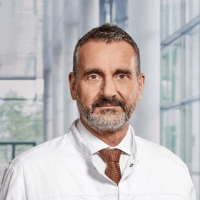Aortic Valve Insufficiency (AVI) with Aortic Valve Replacement in Germany
Treatment prices are regulated by national law of the corresponding countries, but can also include additional hospital coefficients. In order to receive the individual cost calculation, please send us the request and medical records.

Department of Cardiothoracic Surgery
According to the Focus magazine, the Department of Cardiothoracic Surgery ranks among the top German medical facilities specializing in the surgical treatment of diseases of the cardiovascular system and lung cancer! The department offers the full range of surgical services for the treatment of diseases of the cardiovascular system, respiratory tract, including heart and lung transplantation, artificial heart implantation. The therapeutic options include aortic surgery, coronary artery bypass grafting, transplantation surgery, surgical treatment of heart rhythm disorders (arrhythmias), minimally invasive surgery, surgical treatment of the heart valves, including reconstructive interventions. All operations are performed using state-of-the-art technology and in accordance with the current recommendations of professional societies.






Department of Cardiac Surgery
The Department of Cardiac Surgery provides a full range of surgical treatment in its area of specialization. Special emphasis is placed on heart valve repair and replacement surgery, coronary artery bypass grafting, thoracic aortic surgery, adult congenital and acquired heart disease surgery, pacemaker and defibrillator implantation, and artificial heart implantation for severe heart failure. Many heart operations are performed using minimally invasive techniques, which has a positive effect on the healing of the surgical wound. Minimally invasive cardiac procedures also reduce surgical risks and contribute to a rapid recovery of the patient in the postoperative period. Surgical treatment of cardiac pathologies is performed in advanced operating rooms equipped with the latest technology. The cardiac surgeons of the department successfully perform routine and complex surgical procedures, saving the lives of thousands of patients. The specialists work in accordance with current clinical protocols and follow the recommendations of the German Society for Thoracic and Cardiovascular Surgery (DGTHG).


Department of Cardiothoracic Surgery and Vascular Surgery
The Department of Cardiothoracic Surgery and Vascular Surgery provides effective surgical treatment for diseases of the heart, respiratory system, and blood vessels. The team of cardiac surgeons operates on patients with heart valve pathologies, coronary heart disease, heart failure, and heart rhythm disturbances. In the field of thoracic surgery, the key focus is on the surgical removal of lung tumors and lung metastases. The specialists in this area also perform surgery to repair chest wall deformities. In the field of vascular surgery, interventions for abdominal and thoracic aortic aneurysms are most often performed here. The department's vascular surgeons are also exceptionally competent in the treatment of peripheral occlusive arterial disease. A great advantage for the department's patients is that almost all surgical interventions are performed using minimally invasive techniques, so there is no need for a long postoperative recovery. The department's operating rooms are equipped with state-of-the-art technology. This allows for effective and safe treatment. The priority is always personalized medical care for patients.






The aortic valve can rarely be repaired. Doctors typically perform replacement surgery in both cases of aortic valve stenosis and insufficiency. Valve replacement is an open surgical procedure, which is not safe, so it is better to undergo your surgery in a good hospital to avoid any complications. You can get medical care abroad. You are welcome to visit the Booking Health website to find out the cost of treatment in Germany and compare the prices of treatment at different Cardiovascular Surgery Centers.
Content
- What is aortic valve insufficiency (AVI)?
- Indications for surgery to treat aortic valve insufficiency
- How is surgery for aortic valve insufficiency performed?
- Benefits of treatment in Germany for aortic valve insufficiency
- Organization of treatment in Germany for aortic valve insufficiency
What is aortic valve insufficiency (AVI)?
There are two types of blood circulation circles in the human body, namely large and small ones. The large circle begins in the left ventricle, from where blood enters the aorta through the aortic valve.
The valve is needed so that the blood flows only in one direction and does not return to the heart. When the heart contracts, blood is ejected into the aorta, at which point the valve is open. When the heart relaxes, the valve closes, preventing blood from flowing back into the left ventricle.
But if the patient's aorta becomes too wide or the heart valve leaflets are damaged, the aortic opening does not close completely. As a result, during the period of relaxation of the heart, part of the blood returns back to the left ventricle, overloading it. This phenomenon is called valvular insufficiency or regurgitation.
The greater the severity of the failure, the more blood returns and the greater the load on the heart. As a result, the heart gradually changes as the left ventricle expands, which can eventually lead to the development of heart failure. Valvular heart disease should therefore be timely treated to avoid this. You can completely get rid of this condition with the help of surgery.
Indications for surgery to treat aortic valve insufficiency
Aortic valve replacement is considered the main treatment option for aortic valve insufficiency (AVI). The operation is, however, not performed on patients immediately after the detection of the disease. If a patient does not have any symptoms and a mild form of aortic insufficiency is diagnosed, patients are treated with medicines, such as beta blockers, ACE inhibitors, and vasodilators.
Conservative treatment, including drugs and non-drug procedures, does not affect the prognosis of aortic valve insufficiency. Medicines only temporarily compensate for hemodynamic disorders.
Aortic valve replacement surgery may be indicated for patients with the following conditions:
- severe aortic valve insufficiency, regardless of the patient's symptoms and left ventricular function;
- asymptomatic aortic regurgitation in the case of impaired function of the left ventricle (ejection fraction less than 50% at rest);
- the presence of aortic regurgitation in patients who are scheduled for other cardiac surgery (coronary artery bypass grafting, surgical aortic interventions, or surgery on other heart valves); aortic valve replacement can be performed concurrently with the main surgical procedure in this case;
- significant dilatation (expansion) of the left ventricle with an end-systolic dimension of 55 mm or an end-diastolic diameter of 75 mm;
- expansion of the aortic root up to 55 mm in any patient;
- expansion of the aortic root up to 50 mm in patients with Marfan's syndrome;
- expansion of the ascending aorta up to 45 mm in patients with Marfan syndrome and in the presence of risk factors in the patient.
The risk factors that are taken into account when determining indications for aortic valve replacement are a rapid increase in the diameter of the aorta (2 mm per year or more), planning a pregnancy, or a burdened family history (if there is information about cases of severe aortic valve insufficiency in the patient's relatives).
How is surgery for aortic valve insufficiency performed?
Aortic valve replacement is performed during open surgery using a heart-lung machine. A doctor places an artificial heart valve inside the aorta, which can be mechanical or biological. Heart valve replacement can solve the problem of both aortic valve stenosis and aortic valve insufficiency.
Aortic regurgitation is usually of rheumatic origin. In the anamnesis of patients, there is almost always information about previous rheumatic fever. This means that:
- most patients are young and middle-aged people;
- most patients have heart valves other than the aortic valve that are also damaged.
Due to these circumstances, surgery typically includes not only aortic valve replacement but also the repair or replacement of other heart valves.
The type of artificial aortic valve chosen by patients is influenced by their age. In Germany, healthcare professionals prefer to implant mechanical prostheses in patients under the age of 60-65. With many shortcomings, they last longer than bioprostheses, which wear out over time, and on average, after 10 years, a person needs a second operation to replace the prosthesis. If a mechanical artificial aortic valve is implanted, it can serve for decades without requiring any repeated replacement surgery. Such a heart valve is usually enough for the patient's entire life.
At the same time, the mechanical artificial aortic valve has disadvantages. These are the following:
- worse hemodynamics;
- patients' physical activity levels are lower;
- limited opportunities for physical labor and sports;
- blood clots are more likely to form;
- patients have to take anticoagulants for life after their surgery;
- if the regimen of taking anticoagulants is impaired or insufficient laboratory control is provided, the risk of complications increases.
Because of these shortcomings, biological heart valves are implanted in the elderly. They do not last as long, but anticoagulants only need to be taken for 3 months, and the heart function of patients after such an operation is better. After a while, the heart valve degrades, but it can be replaced. Repeated heart valve replacement surgery is often performed using a minimally invasive procedure through blood vessels in the groin rather than through a chest incision.
Benefits of treatment in Germany for aortic valve insufficiency
If you have aortic valve insufficiency (AVI), you can undergo your treatment in Germany. In German hospitals, the operation is performed by experienced and highly qualified cardiac surgeons. Many doctors are highly reputable not only in Germany but also far beyond its borders.
The benefits of treatment in Germany for foreign patients include the following:
- there are the most modern procedures and operations available;
- German hospitals have state-of-the-art equipment;
- reliable results from aortic valve replacement;
- doctors can concurrently perform not only aortic valve replacement, but also the replacement or repair of other heart valves in one operation;
- simultaneous treatment of valvular heart disease and other pathologies is possible;
- a low risk of complications;
- high-quality postoperative care and rehabilitation of patients;
- a relatively low cost of treatment in Germany when compared with other developed countries.
Organization of treatment in Germany for aortic valve insufficiency
You are welcome to use the Booking Health website to undergo your treatment in Germany. On our website, you can get information about the cost of treatment in Germany, compare prices in different German hospitals, and select the most suitable medical care program.
Please leave your request on the Booking Health website to get a consultation. Our specialists will provide you with additional information about hospitals and doctors, help you choose a German hospital that specializes in aortic surgery and demonstrates the best results in the treatment of aortic valve insufficiency (AVI).
When you choose a treatment program through the Booking Health service, the cost of treatment in Germany will be lower for you than if you seek medical attention directly from a German hospital. Prices will be reduced due to the absence of increased taxes for foreign patients.
The Booking Health staff assists patients in organizing their trips to Germany for treatment. Our company's specialists will contact the administration of the German hospital and make an appointment for your preferred dates. They will also translate your medical documents into German, book a hotel room and airline tickets, meet you at the airport in Germany, and take you to the hospital by car. After the heart valve replacement, the company's employees will translate information on recommendations for further treatment into your language, keep in touch with the hospital, and provide remote medical consultations for 3 months. Whenever required, our company will take care of buying medicines in Germany and forwarding them to your native country.
Authors:
The article was edited by medical experts, board-certified doctors Dr. Nadezhda Ivanisova and Dr. Vadim Zhiliuk. For the treatment of the conditions referred to in the article, you must consult a doctor; the information in the article is not intended for self-medication!
Sources:
ECR - European Cardiology Review

